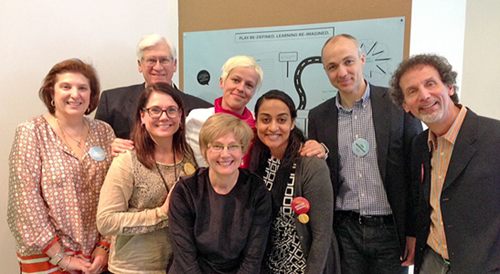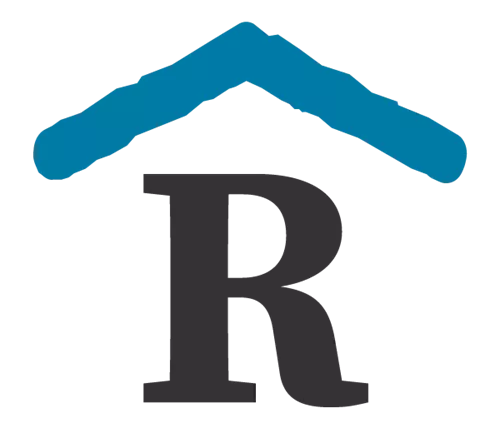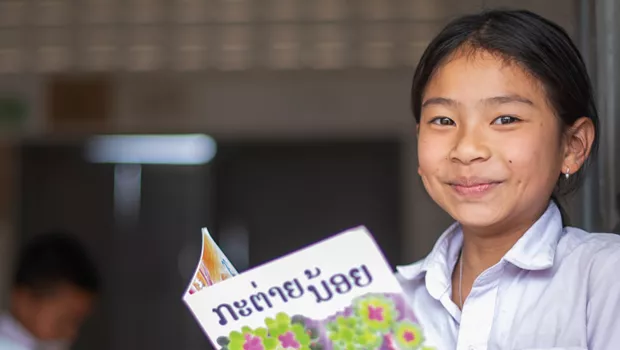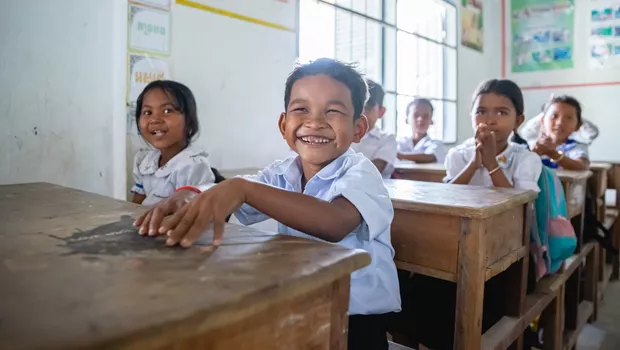In the course of my work to catalyze the resource engine supporting Room to Read programs, I get the opportunity to interact with some incredible people and, in the process, shape and re-shape my own worldview. I had one such opportunity last month at the IDEA Conference, when I found myself in an “Idea Lab” with a group of individuals who represented a unique cross-section of stakeholders in the education space. We were all there with one goal, to re-imagine and re-define learning and play.
“What would you want the headlines to read in 10 years with reference to education?” This was the question posed to participants in one of the “Idea Labs” at the recent IDEA Conference hosted by the LEGO Foundation.
We wondered: Why can’t we harness the energy and creativity that kids naturally put into the way they play and put it into the way they learn? While the rest of the world seems to have used technology to evolve in exciting and engaging ways, why does the classroom look almost exactly as it did 100 years ago?
Our response: What if in 10 years the headlines read “What happened to the classroom?”
Know-Networks and Do-Plomas, New Engines for Learning
Know-Networks, in our collective vision, would be online platforms, created by and for children to learn, play and create together. Learning could be driven by children’s innate curiosity as they formulate their own questions and create the peer networks they need in order to answer those questions. And do-plomas (instead of diplomas) would measure what children create and what problems they solve. This way, children can learn the immediate value of developing problem solving skills and creativity instead of having to rely on promises of payoff later for memorizing countless facts. Lisa Jordan, Executive Director of Bernard van Leer Foundation, one of my team members, digs into the concepts in her blog entry Re-Imagining Learning and Play.
 Geetha Murali and fellow IDEA Conference participants
Geetha Murali and fellow IDEA Conference participantsI found our team’s collective approach disruptive, quirky, challenging and just plain brilliant. Of course I would want my children to be empowered and to learn in this enlightened world!
However, I kept getting held up on one thing. Should this idea truly become a reality, how would we bring all children along towards this new educational utopia? I see the children on our programs being challenged every day to exercise their basic right to learn. The only reason they are able to take major steps forward is because Room to Read brings effective education into their lives through teacher training, quality learning materials, family and community engagement, and government relationships. We face even greater challenges when we attempt to account for gender inequality and provide additional support to girls. In other words, we operate our programs within a complex ecosystem, attempting to disrupt several moving parts to achieve measurable learning outcomes. How would the children in the communities where we work be able to plug in to know-networks and be the agents of their own learning and futures?
“Room to Read programs are already dramatically improving education in 10 countries around the world through innovative approaches to education.”Geetha MuraliChief Development Officer, Room to Read
I then realized, that’s why we are here! Our responsibility as an international development organization targeting literacy and gender equality in education is to make sure that any steps we take to reform education practice can benefit all children. Room to Read programs are already dramatically improving education in 10 countries around the world through innovative approaches to education. We are revolutionizing and revitalizing ineffective schools by creating child-friendly environments, by empowering children like Moni to write the books that she and her peers want to read, and by training teachers to go beyond route memorization to creatively engage students in the learning process. With the space Room to Read has been given in government schools to create literate environments, we must steer our children towards a better future – a future where children can be the agents of their own learning, and where they have the tools and skills to flourish in the world around them. We must take up this challenge for all children everywhere in the world, whether they are online or offline, rich or poor. We, as a community of action, along with other NGOs, donors and government partners must ensure that all children are supported towards claiming the same inalienable rights – to play, to read, to learn, and to thrive.
We are well aware of the many roadblocks on the path to functioning “know-networks” – entrenched and archaic systems, politics, unequal access to technology, and the list goes on... But, we must remember that at its heart, the concepts of know-networks and do-plomas are about empowering children to guide their own learning and follow their own creative will. Then as practitioners, we will create and implement programs that push the world’s systems towards that vision. If, together, our collective networks drive change towards educational utopia, then our children and their children will benefit – and that is the point, isn’t it?



